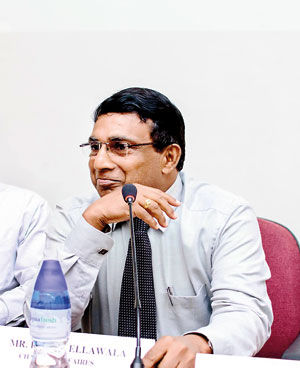An interview with the founder of Sri Lanka Model United
 In conversation with the Chargé d’affaires of Sri Lanka Model United Nations (SLMUN), Mr. Rohan Ellawala. Mr.Ellawala is the founder of SLMUN. His passion and intentions to bring international relations and diplomacy to the youth of Sri Lanka has led to the creation of this significant conference. Over the past decade SLMUN has created many of the proficient diplomats today.
In conversation with the Chargé d’affaires of Sri Lanka Model United Nations (SLMUN), Mr. Rohan Ellawala. Mr.Ellawala is the founder of SLMUN. His passion and intentions to bring international relations and diplomacy to the youth of Sri Lanka has led to the creation of this significant conference. Over the past decade SLMUN has created many of the proficient diplomats today.
What was your initial aim when you started back in 2005?
It was the period when English medium was introduced to government schools. The main objective was to create a platform for students to develop public speaking, writing, researching skills and teach the art of diplomacy.
What led to the creation of SLMUN?
In 2004 we put together a delegation of senior students and went to India for a conference. There I saw young Indian students debating and actively participating to find solutions for ongoing world problems. So I thought to myself ‘Why shouldn’t I start something similar in Sri Lanka?’ Once I returned, the concept of MUN was introduced to grade 8 students and I encouraged them to learn. I too had to learn the procedures.
In 2005 I took a delegation to India consisting of the grade 9 students. They were not recognised during the sessions which led them to be very worried but I told them not to be disappointed in this matter and to do better in the future. As a result we started Simulation SAARC in December 2005. We had only 60 students from about 8 schools. We held this conference successfully again in 2006 and 2007 with more students and schools participating. During this period we attended many Oversees Conferences to gain much needed experience. In 2007 we received the best delegation award at the Indian MUN. In 2008 in USA we received two Best Delegate awards and 4 Higher Commendation awards.
How did Simulation SAARC evolve to SLMUN?
Gradually Simulation SAARC grew from 60 students at the beginning to 250 students in 2007. We needed to expand this further. Since SAARC consists of only 8 countries we decided to use the UN system where we can take advantage of 193 countries and multiple committees. Thereby we were able to provide opportunities to a larger number of students. So in 2008 we held the first Sri Lanka Model United Nations conference. We had around 600 students that year and since then it has gradually increased in size and hence in impact.
What insight have you gained by being the Chargé d’affaires for the past 12 years?
Every conference is a challenge and it comes with a lot of pressure. It is a learning experience not only for the delegates but for me and the organising committee as well. I take much pleasure working with each year’s 40-50 members of the executive committee. I divide tasks among them and merely guide them so they learn and understand the practical aspects in logistics, financing and public relation which leave them gaining a lot of experience on how to handle real world matters.
What are some of your most memorable moments from the years?
Every conference is a memorable one. In 2012 we had one of our biggest conferences. We had over 1000 delegates including 175 foreign delegates taking part from Maldives, Bangladesh and all parts of India.
What is the main focus of SLMUN 2019?
To create a platform for students to work together and find a solid solution for the question, unlike in previous years where delegates debate and argue with one another to make few resolutions.
What’s one piece of advice you would give to the new delegates coming in this year?
They must learn the art of diplomacy; How to negotiate, how to compromise and how to find solutions for the question. To excel at this they must do their research on subjects like history, geography and political science. They should possess general knowledge by reading newspapers, watching news bulletins and being up to date on current world affairs. I believe this to be the key in becoming a good delegate.
What do you believe is the next step for SLMUN?
The plan is to finish this year’s conference, learn from our mistakes and experiences and then create a better, more meaningful conference with a greater impact next year.
Registrations now open for the 12th session!
For more information please visit our website at www.slmun.org or contact 0718013722 / 0761603253.
Also visit our Facebook, Twitter and Instagram pages to keep up with the workshops.
-Vinhara Randeny


